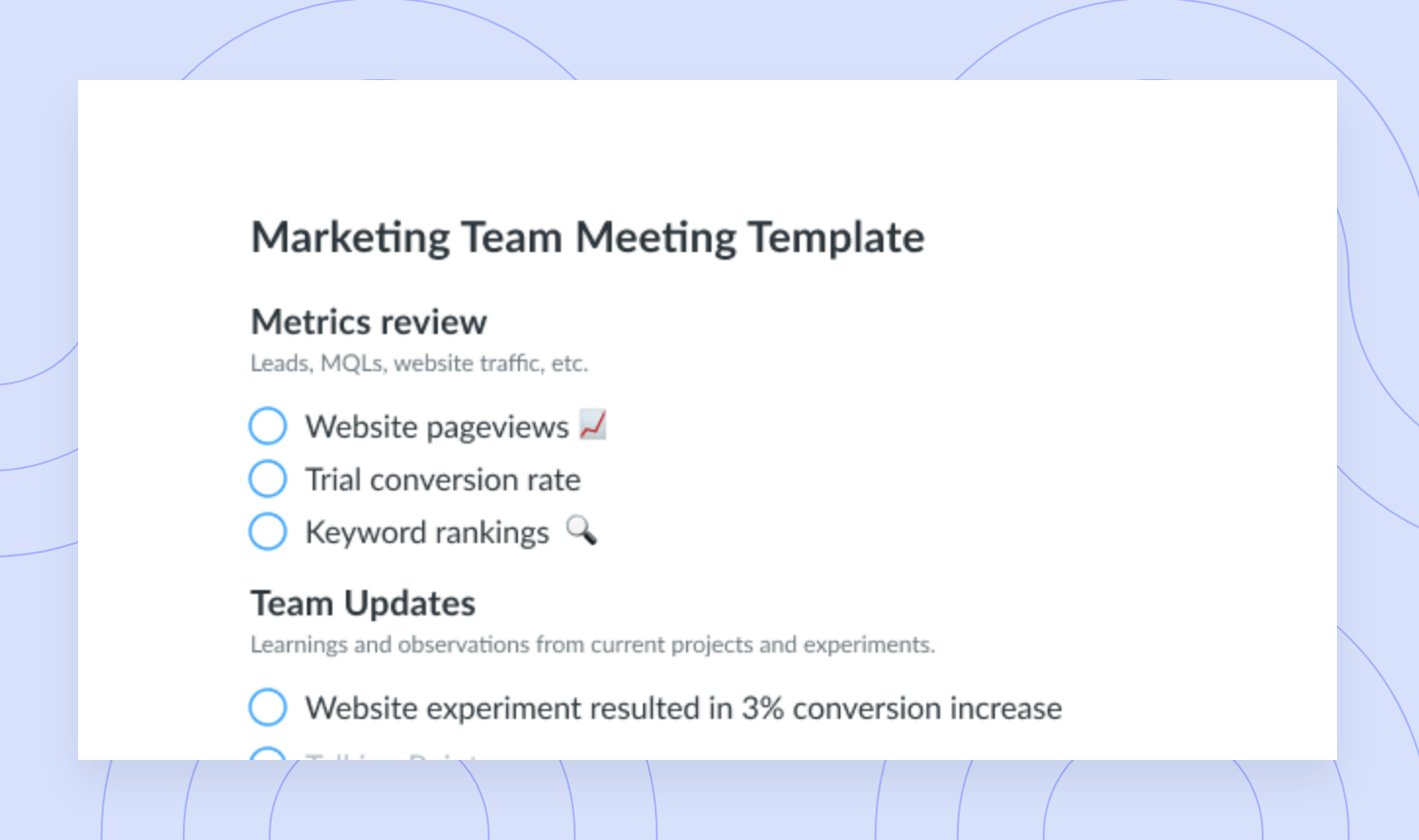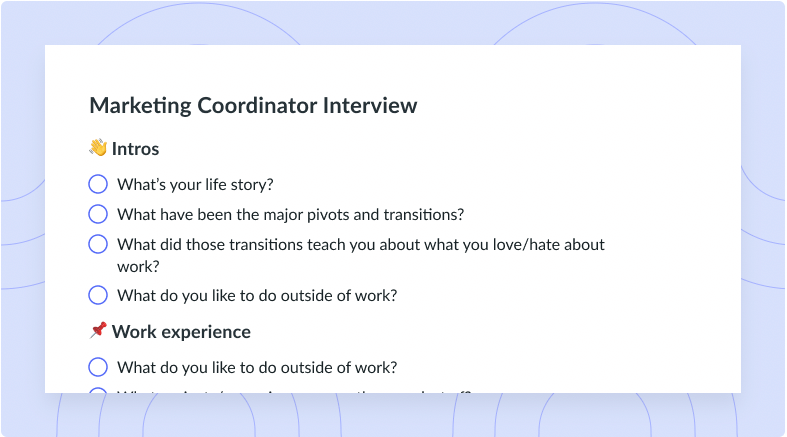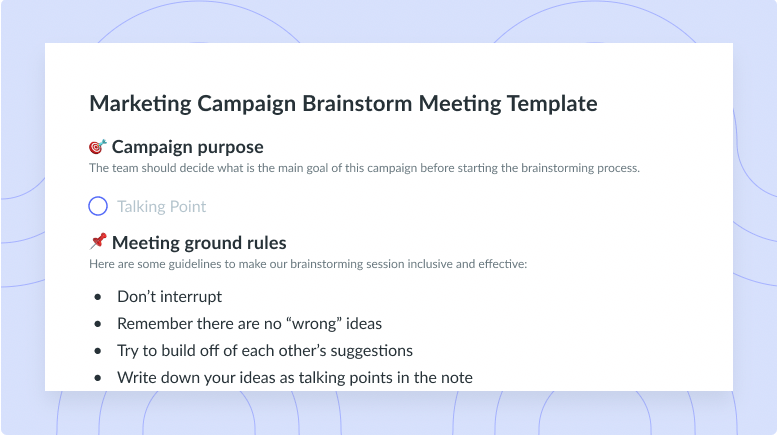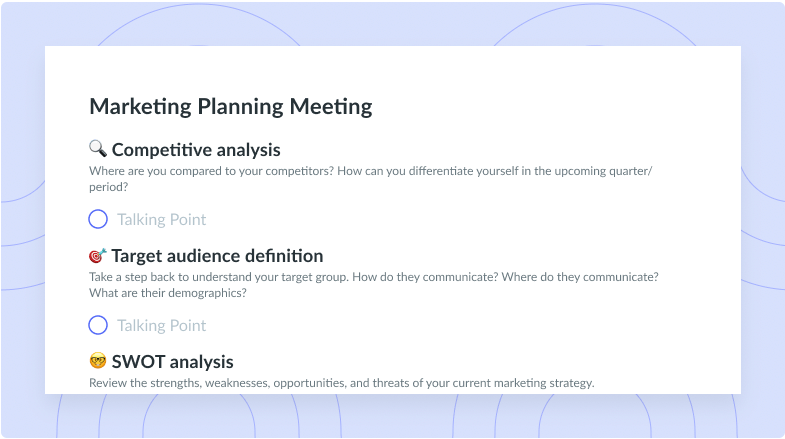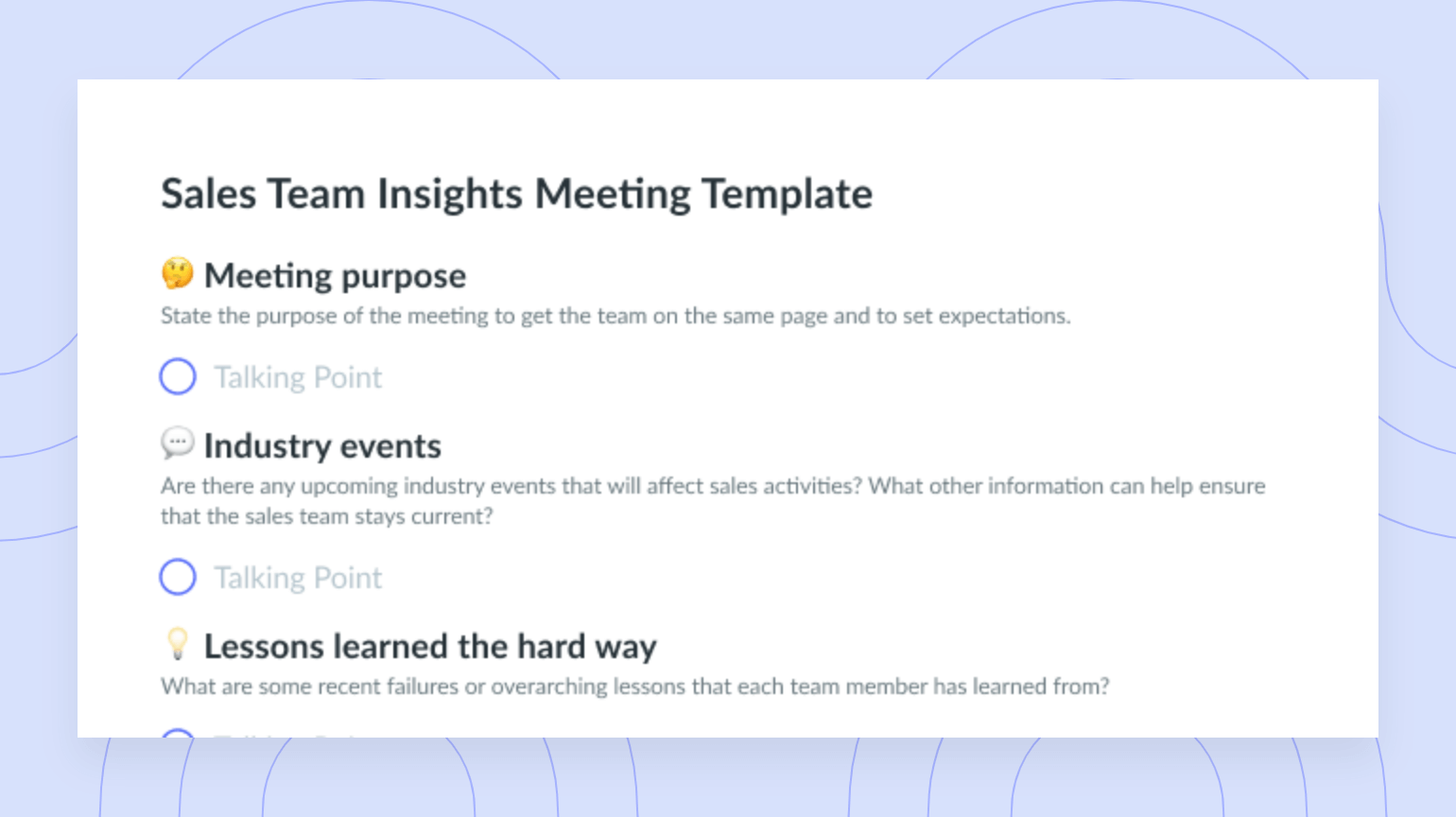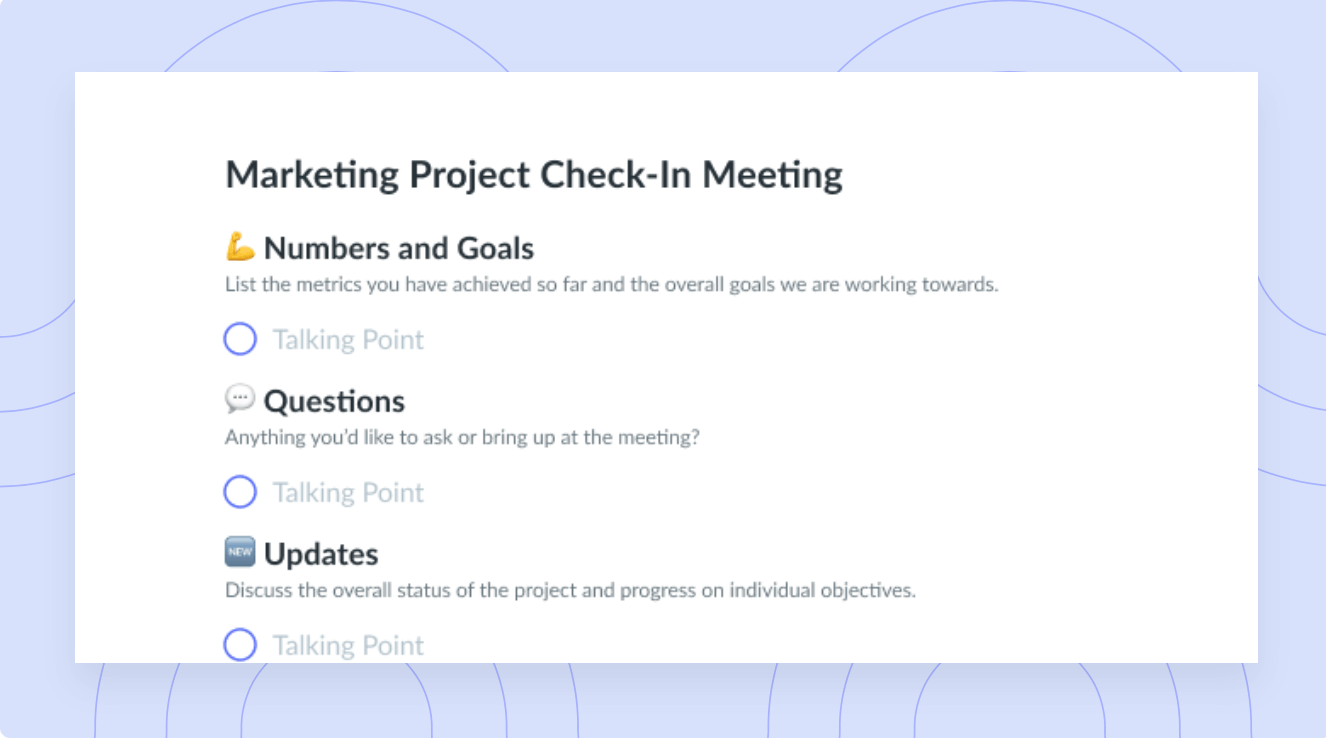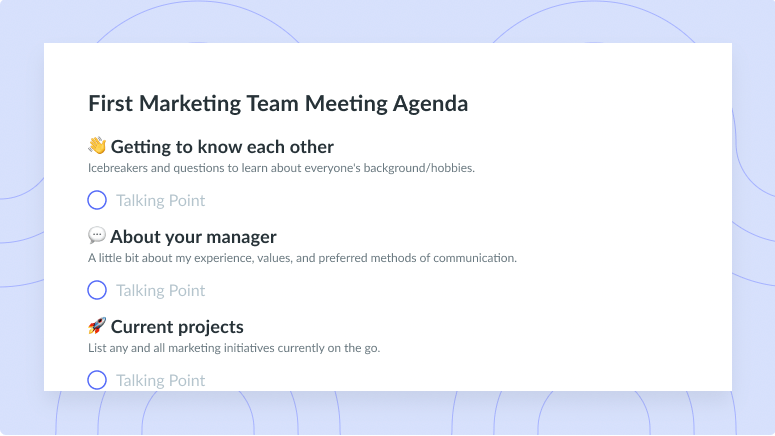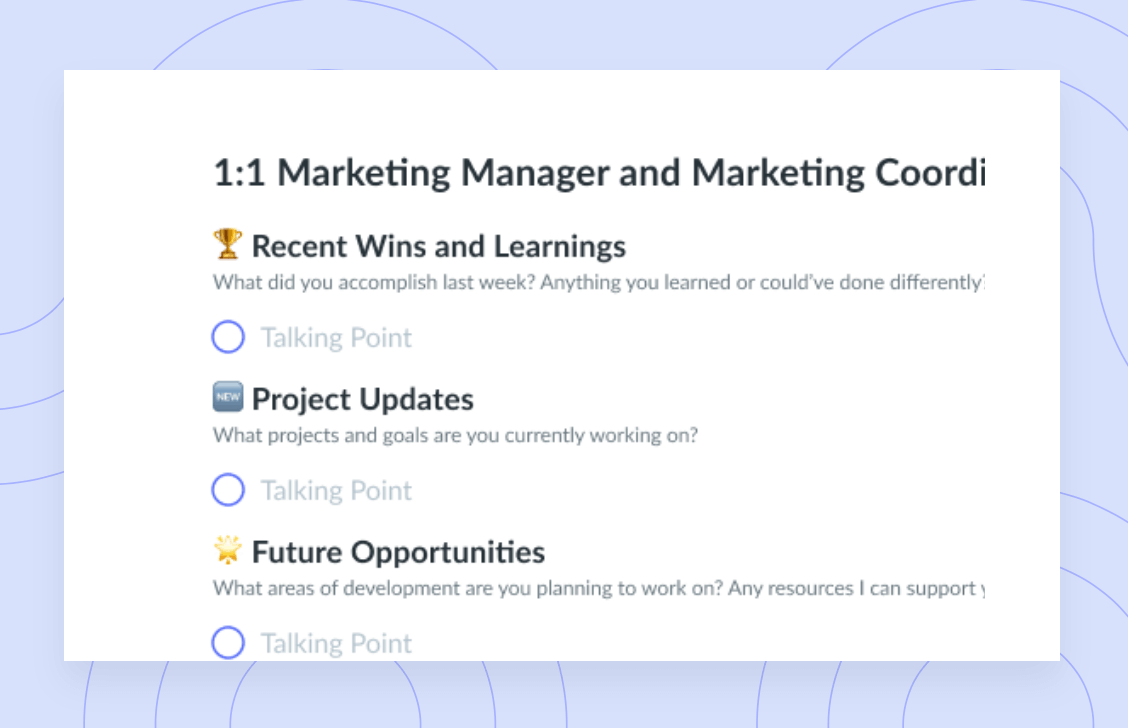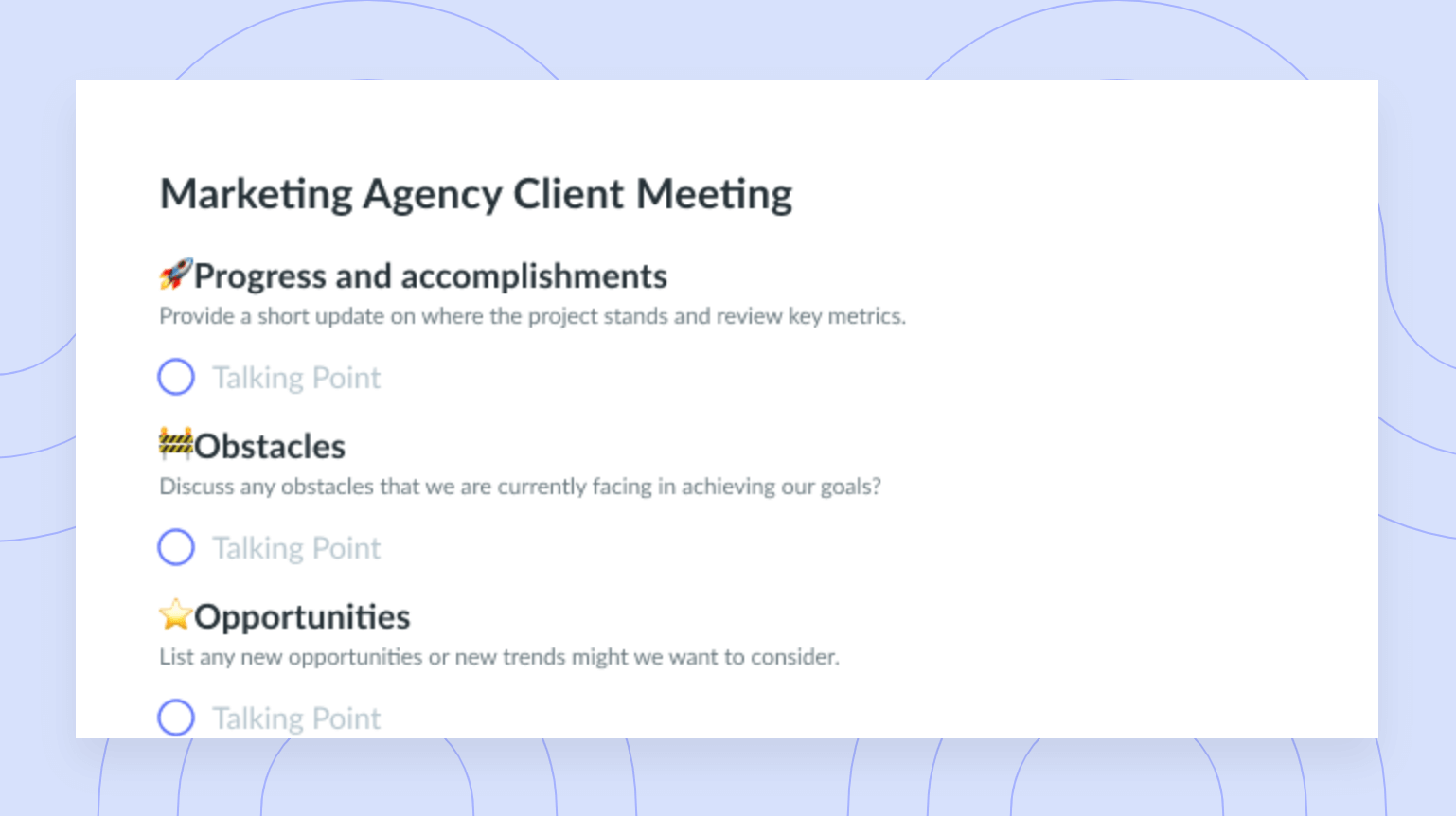Marketing Meeting 101: This Is How to Run It Successfully [+ Free Templates]
Read on below to find some of the best strategies to make your marketing meetings a success. Plus, get free templates!
Running a marketing meeting means more than sitting your best and brightest around a conference table. It also means looking at what you’ve already done well and what’s next on your plate. It means zooming out and taking it all in instead of just spewing out new idea after new idea. Below are some tips and tricks to help your next marketing meeting go off without a hitch.
- What is a marketing meeting?
- 10 tips on how to run an effective marketing meeting
- Why are marketing meetings important?
- Free marketing meeting templates
What is a marketing meeting?
A marketing meeting is a gathering of you and your team members to plan out campaigns to have the most effect. These meetings can be broken down further based on your goals. Marketing team meetings, for example, are great for collaboratively brainstorming new ideas for future campaigns. Then there are marketing meetings with clients. This type of meeting stays focused on your latest marketing project for the client and how it’s going.

Run delightful marketing meetings
Increase meeting engagement and productivity with a collaborative agenda that the whole team can contribute to. Try using a tool like Fellow!
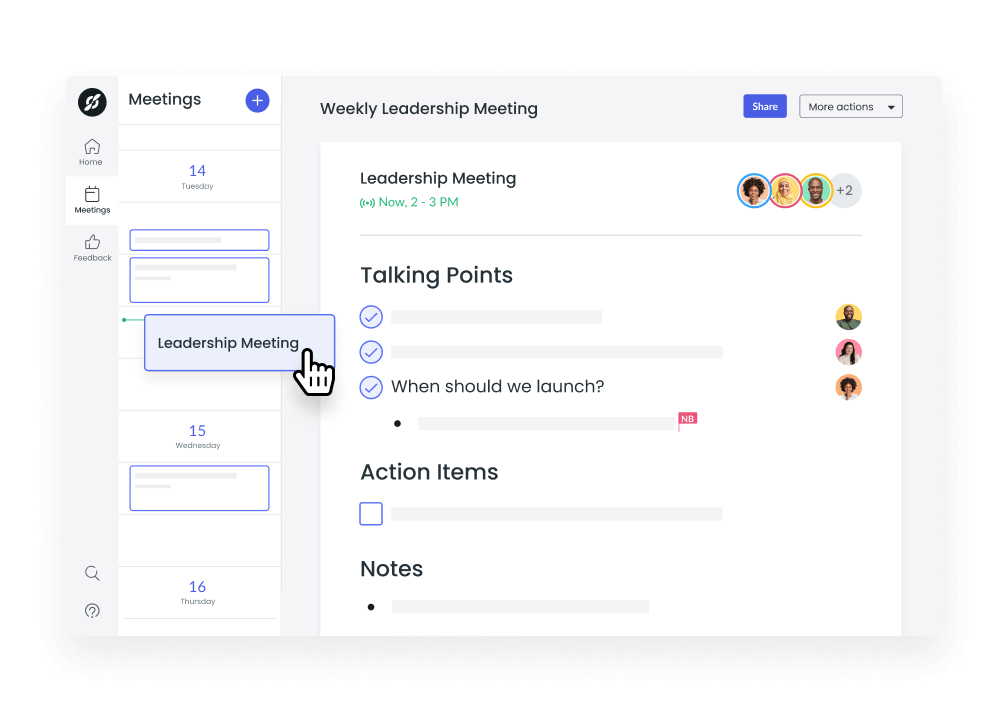
10 tips on how to run an effective marketing meeting
There are several ways you can get the most out of your marketing meetings. If anything, even though two different marketing meetings could concern two totally different campaigns, you could run all your meetings roughly the same. They can also be useful for any meeting – don’t be afraid to use the below tips across the board.
- Define the meeting’s purpose
- Figure out who to invite
- Create and share an agenda
- Review your past and ongoing projects
- Review important metrics
- Open the floor for discussion
- Cut down on distractions
- Go over goals and celebrate wins
- Add some educational content
- Plan your upcoming campaigns
1Define the meeting’s purpose
One of the most effective ways you can get a meeting running smoothly is to be sure why you’re running it in the first place. This tip might seem obvious, but some marketing managers might cram a bunch of topics into one meeting. And look, we get it – there’s always a lot to discuss in marketing! – but there’s always an upper limit. Not all the topics you want to discuss will fit into a standard meeting.
If a meeting topic is too shallow – say, running in circles around one low-value metric – then you risk wasting your team’s time. (This is where asking “should this meeting be an email?” comes in handy.) On the opposite end of the spectrum, if you want to discuss too much, the meeting could run longer than everyone had planned. You’ll know you have a well-defined goal if you’re confident it’ll keep things on track and lead to meeting action items to work on afterward.
2Figure out who to invite
While you can technically invite as many people as you’d like, there’s an upper limit to that too. A meeting with too many people can lead to an idea soup where too much is floating around and it gets overwhelming. Or there could be a silent majority and just a few people who overtake the whole conversation. That’s why you’re best off keeping the guest list low for the most effective marketing meetings possible. Try to cap it at six people, and make sure these team members’ knowledge and experience are relevant to the topic at hand. The best ideas come from the people who know best.
3Create and share an agenda
A meeting agenda is the bread and butter of running effective meetings. You can use your agenda to detail your meeting from start to finish and assign blocks of time for each talking point. Your agenda should also be clear on your meeting objectives so that everyone is on the same page.
In that vein, send out your agenda as early as possible. Sending it only a few days beforehand doesn’t give everyone long enough to get ready for your marketing meeting. Instead, try giving everyone a week or more to prepare. This way, they can play an active role in your conversations and suggest other topics to cover during your marketing meeting. Maybe one of those topics will lead to the breakthrough you need.
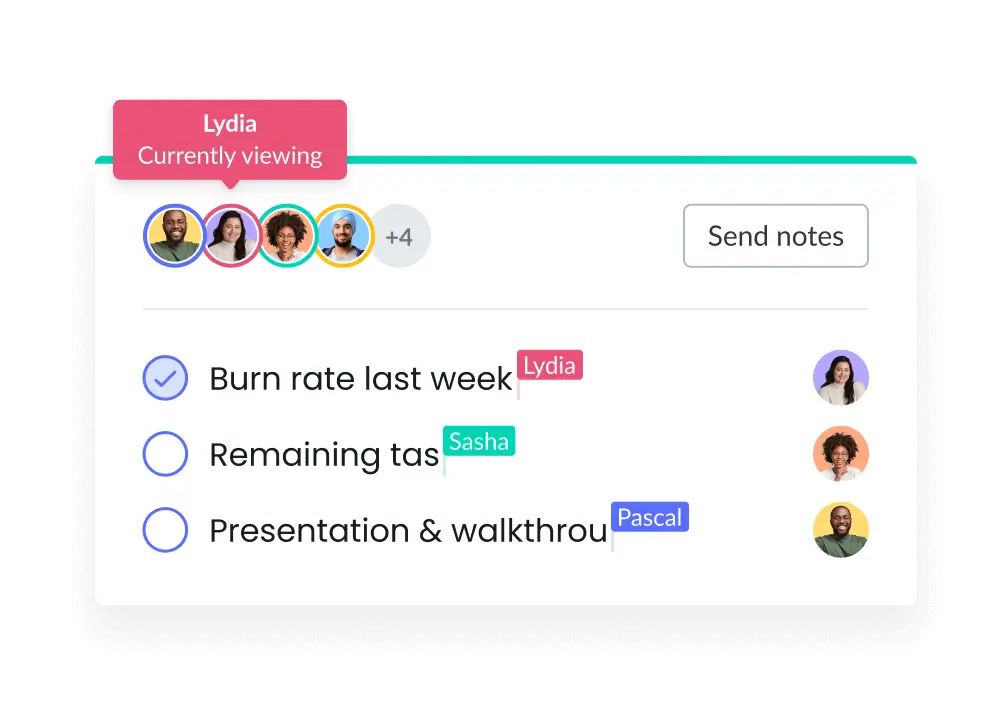
4Review your past and ongoing projects
A great marketing meeting includes a review of past and present marketing campaigns. These reviews can help you see what’s going well (or not going well) with your current campaigns. This way, you can tell which marketing efforts have resonated with the audience in the right way. Fold those tactics into your upcoming campaigns, and you might be on to something. You’ll also give yourself time to course-correct if something isn’t going as planned.
5Review important metrics
A marketing meeting is a perfect opportunity to go over your metrics. Following the numbers helps you and your team figure out which marketing campaigns have been successful – but you know this. What you might not have yet realized: Following the right numbers matters.
Metrics like lead generation and website traffic are great starting points, whereas more “zoomed in” metrics like email open rates and social media reach aren’t as informative. The latter two are more like the grand results of all your marketing campaigns. You’re trying to keep things focused on one campaign at a time, so look at higher-level metrics you can quickly tie to marketing,
6Open the floor for discussion
A well-run meeting includes time for open conversation that relates to your agenda items while giving everyone a chance to go off the page. This way, your most creative team members can bounce ideas off of each other. These ideas might not have been on the agenda, but maybe one of them is that diamond you’ve been needing. That gem can help you create more effective marketing campaigns in the future.
7Cut down on distractions
Distractions are everywhere, and they’re especially challenging when you’re talking about marketing. You’re probably getting pretty in the weeds as you talk – any distractions could make it tough for team members to find their way back.
The most effective marketing planning meetings take place in spaces away from the noise of a typical work environment. It also takes place away from screens. Ask everyone to turn off their phones and put away their laptops so they’re not tempted to check their notifications and get distracted. It’s hard to keep track of your most important metrics when your team isn’t paying attention to them.
8Go over goals and celebrate wins
As you’re looking over your team metrics, you should see how well they stack up to your goals. If you’ve hit those objectives, it’s time to celebrate. Doing the same thing day in and day out, it’s easy for team members to start feeling like they’re not part of your success. Applauding their wins helps break that notion and ensures them that their work is appreciated.
9Add some educational content
Marketing is a complex science – an art, even – with all kinds of moving parts. That means there’s always something to learn. Marketing meetings are a great time for that education since all your marketing team members will be there. Try expanding the team’s knowledge through quick presentations that can help them try new techniques. A few well-run marketing meetings in a row can help everyone, whether newbies or vets, become more effective marketers.
10Plan your upcoming campaigns
No marketing campaign can last forever. As the team approaches the end of one campaign, it’s time to start considering the roadmap for the next one. Doing so can help you give each team member something to do that makes the best of their time and skills. It’s also a great way to give everyone a heads-up about what they’re likely to work on next.
Why are marketing meetings important?
What exactly makes marketing meetings so important? The below reasons why you’d call a marketing meeting are just the start.
- Focus the team on relevant topics
- Share news
- Address concerns
- Share ideas
- Ensure understanding
- Make decisions
- Set goals
- Come up with a plan
1Focus the team on relevant topics
The best meetings get everyone working toward a goal, and marketing is super goal-oriented. After all, what is a metric if not a road to a great destination? That road is easier to travel if you gather all your team members to put together the car in real-time. Marketing campaigns are easier to put together when everyone involved in them gathers to figure out what you all need and how to get there.
2Share news
A meeting is one of the best places for you to share updates on the project and the company. Keeping your team up to date on changes is especially important in marketing, and you can do exactly that at marketing meetings. For example, maybe a client has changed their goals and you need to shift your marketing strategy. Sharing that news at a meeting invites everyone to ask questions and open a dialogue that gets the gears in motion.
3Address concerns
A great marketing meeting includes time in the meeting agenda to open the floor to employee feedback. And sure, it can be hard to hear a team member say that they’re not so sure your idea will work. But that could be the start of a conversation that leads to something even better.
4Share ideas
One of the main motivations behind a marketing meeting is getting several people with different ideas working toward a shared goal. With marketing, that’s especially important – you have all kinds of room to be creative. And creative people sharing creative ideas can mean more creative – and effective – marketing campaigns.
5Ensure understanding
Miscommunication is the antidote to marketing success, and a marketing meeting is one of the best ways to correct misunderstandings before they create bigger problems. Your meetings can help get every team member on the same page. This way, everyone agrees on the marketing route you’ll be taking and knows which tasks they have to do.
6Make decisions
Marketing campaigns are all about smart decisions. Do you pivot away from content marketing toward social media, or do you ditch digital media entirely for print? Making these decisions at a meeting lets your team brainstorm with you. That means you get everyone’s experience to help you choose the most effective option.
7Set goals
One of the best ways to measure success is to look at your team’s current metrics, and that’s great to do during a marketing meeting. When those numbers are a little less than ideal, you can easily adjust the objectives to be more reachable. The opposite is also true – your team’s good metrics can inform you that they can handle more.
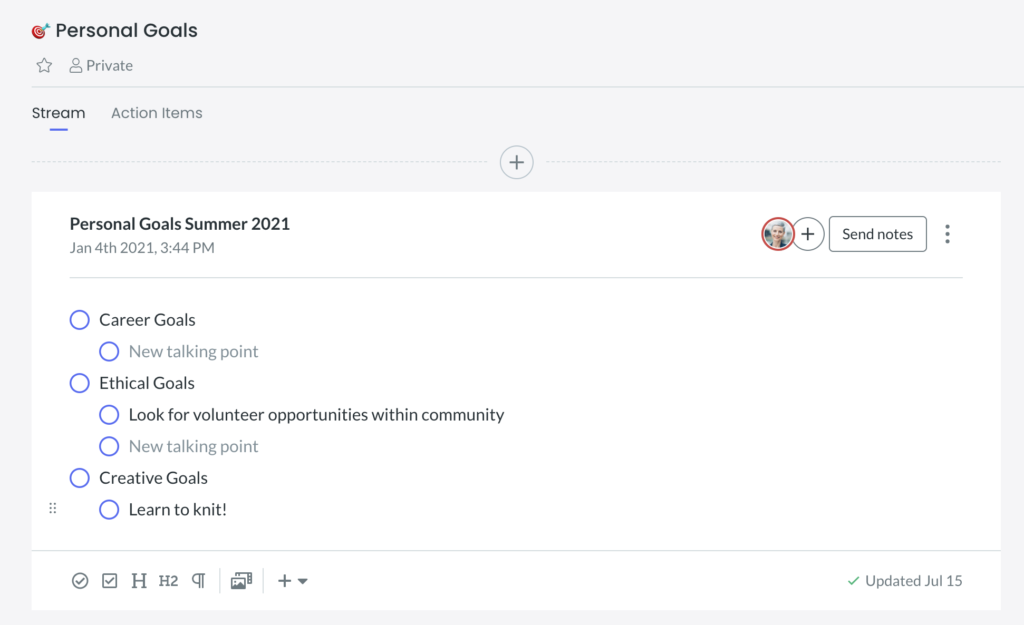
8Come up with a plan
The collaborative environment of a meeting can help you come up with a genius plan to reach the right people with the right messaging. That could mean a high-level overview of your strategy, or it could mean dividing each team member’s time for the tasks best for their talents. Once your plan is in place, get a move on – your meeting might have just led to the success you need.
Free marketing meeting templates
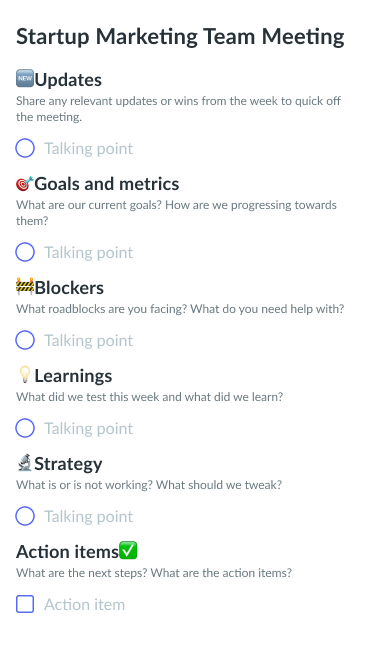
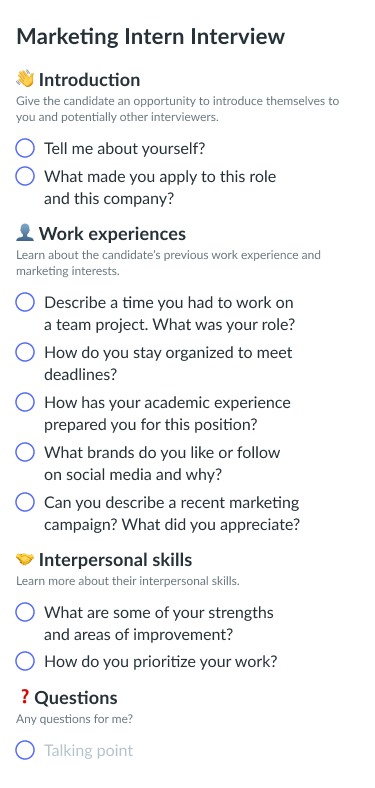

The best way to run a marketing meeting
Hosting a marketing meeting is a bit of a tightrope walk. Great marketing meetings can bring you the success that’s been evading you, but bad meetings can cause employees to tune out entirely. A guide like this one can help you hold better marketing meetings – and so can the right meeting tools.
Fellow is a great example. You can use Fellow’s collaborative agenda creation tools, shared digital notepads, and real-time feedback suite for better marketing meetings. With Fellow in your arsenal, your meetings can inspire the best marketing campaigns possible.



![13 Tips for CEOs on Meeting With Staff [+ Free Templates]](https://fellow.app/wp-content/uploads/2023/01/CEO-meetings-with-staff.jpg)

![15 Brainstorming Techniques to Try [+ FREE TEMPLATES]](https://fellow.app/wp-content/uploads/2022/02/brainstorm-techniques.jpg)
![Product Management OKRs 101 [+ Examples]](https://fellow.app/wp-content/uploads/2022/05/Product-Management-OKR.jpg)
![Client Meeting 101: 6 Tips on How to Plan and Execute [+ Free Templates]](https://fellow.app/wp-content/uploads/2022/06/Client-Meeting.jpg)
![Information-Sharing Meeting 101 [+ Free Templates]](https://fellow.app/wp-content/uploads/2022/05/Information-Sharing-Meetings.jpg)
